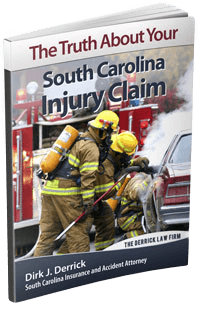What to Do After a South Carolina Boat Accident
Your priority after a boat wreck is to see to the safety of all passengers. Anyone who does not have a life jacket or flotation device should be given one. If you’re physically able to do so, you should first assist anyone who’s fallen into the water since many boating accident fatalities result from drowning.
You should also have a first-aid kit on board to clean and bandage cuts, scratches, or other minor injuries to the best of your ability. If someone has sustained damage to the neck or spine, don’t attempt to move that person unless it’s necessary to prevent drowning or further injury. Once you’ve seen to everyone’s safety, stay at the scene and take the following steps.
1. Report Your Boat Accident
Even if your boat accident is minor, report it to the Coast Guard or law enforcement authorities. An official accident report is essential evidence for the insurance claim or lawsuit. South Carolina law requires you to report a boating accident to the Department of Natural Resources (SCDNR) if the crash results in any of the following:
- More than $2,000 dollars’ worth of property damage
- A totaled vessel
- A missing person
- A serious injury
- A death
2. Exchange Information
Get contact information, vessel identification numbers, and the names of insurers from any other boat operators involved in your accident. You should also get contact information from passengers and other witnesses to the accident. Do not discuss the boating crash, argue, or admit fault for the accident to anyone.
3. Take Pictures
Photographs of the vessels involved, their damage, their identification numbers, their positions, any passengers’ injuries, and the scene of the accident are very helpful in the crash investigation of the crash. These photos may also help determine the liability of the at-fault boater and the damages resulting from the accident.
4. Seek Medical Attention
Even if you don’t have visible injury symptoms, a doctor should examine you as soon as possible after the accident. A doctor's exam and diagnostic tests can detect symptoms that might not appear immediately. Early diagnosis could mean a faster recovery, and a prompt examination provides strong documentation that you were injured in the boat accident, which could be critical to your insurance claim or personal injury lawsuit.
5. Inform Your Insurance Company
Report your boating accident injuries to your insurance company, but do not admit fault. If you’re contacted by adjusters from the at-fault boater’s insurer, give only the most basic information, do not give a recorded statement, do not grant access to your medical records, and do not accept a quick settlement offer for your damages, the full extent of which you probably don’t know yet. For further communication, refer the insurance company’s representatives to your attorney.
6. Consult a Boating Accident Lawyer
An experienced boat accident lawyer can:
- Investigate your accident to prove liability
- Interview passengers and other witnesses to the boat accident
- Obtain video footage of the boat accident if you happened to be near a security camera on the shoreline or mounted on a dock
- Consult with your doctors, organize your medical evidence, and present it convincingly to an insurer or the court, if necessary
- Put a monetary value on your pain and suffering to evaluate your case
- Demand a fair settlement from the defendant’s insurer and negotiate compensation
- File a lawsuit and take your case to trial if necessary to obtain fair compensation
Boat Accident Compensation
You deserve fair compensation for all of your boating injuries. Damages you could be entitled to after suffering an injury in a boat accident due to someone's negligence could include:
- Medical expenses. You may seek compensation for all current and future medical bills related to the boat accident, including surgeries, hospitalization, doctors’ appointments, medications, rehabilitation, and ongoing treatment.
- Pain and suffering. Your physical pain and emotional suffering are hard to quantify but are a significant part of your fair recovery.
- Lost income. If the accident caused you to miss work or resulted in a long-term disability, you may recover lost wages, benefits, self-employment income, and future earning capacity to ease the financial burden.
- Property damage. Compensation can include repairs or replacement costs for damaged or lost property, such as your boat or personal belongings.
- Disability and impairment. If the accident led to a permanent disability or impairment, damages can account for the impact on your quality of life, mobility, and daily activities.
- Loss of consortium. In cases where a loved one is seriously injured or killed in a boat accident, you may recover damages for the loss of companionship, care, and support.
- Punitive damages. In cases of extreme negligence or intentional harm, punitive damages may be awarded to punish the responsible party and deter similar behavior in the future.
Additional damages may be possible after fatal boating accidents. For example, you may be able to recover compensation to cover funeral and burial costs, alleviating the financial burden on the family.



